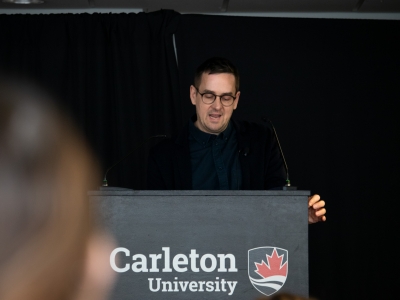Closing Panel features Heinbecker arguing for intervention in Syria.

In Syria, we have the worst death tolls since Rwanda, but leaders don’t want to intervene. They’ve put it in the ‘too hard’ file.-Paul Heinbecker
Paul Heinbecker, Canada’s former permanent representative to the United Nations and prime ministerial advisor, offered a clear message in his keynote address for the Closing Panel of the 2015 FPA Research Month.
“In 2014, 76,000 people died in Syria. If the U.S.-led coalition can use its air power to stop ISIS, it can stop the barrel-bombing and other air-launched atrocities of the Assad regime,” said Heinbecker.
His comments were significant, especially in light of the advice he gave Prime Minister Jean Chretien in the 2003 run-up to the Iraq War. Heinbecker told the audience about his phone call with the prime minister, shortly after Chretien talked to British Prime Minister Tony Blair, who pressed Canada to support an invasion. Heinbecker was at the United Nations in New York.
“I told him it was a war of first choice, not last course, and it was being fought on a phony basis,” recalled Heinbecker. “No one believed the U.S. and Britain had just cause.”
However, Heinbecker said each situation is unique, as is the case with the current threat from the Islamic State.
“ISIS has declared a caliphate and has threatened to destabilize the entire Middle East and us as well. The longer it succeeds, the more difficult our problems become,” said Heinbecker. “The attitude of the U.S. administration is that this has gone too far. Whether Canada should participate is another matter. We need to have modest and clear objectives.”
Heinbecker was joined onstage by Professor Stephen Saideman of the Norman Paterson School of International Affairs and Law, Legal Studies Professor Doris Buss, and John Higginbotham, a senior fellow with Heinbecker at the Centre for International Governance Innovation. (CIGI)
Saideman mentioned the timeliness of Heinbecker’s advice, given Canada’s increased role in the battle against ISIS. But he added, “The situation in Syria makes Iraq look easy. In Iraq, we had something to build on, but in Syria, no.”
Buss pointed out that the standard view of conflict doesn’t accurately depict the effect on women and children. She argues for a feminist, more ethical, foreign policy. “We are not a muscular military power and I don’t think we should be.”
Friday, March 27, 2015 in FPA Research Series, News
Share: Twitter, Facebook



